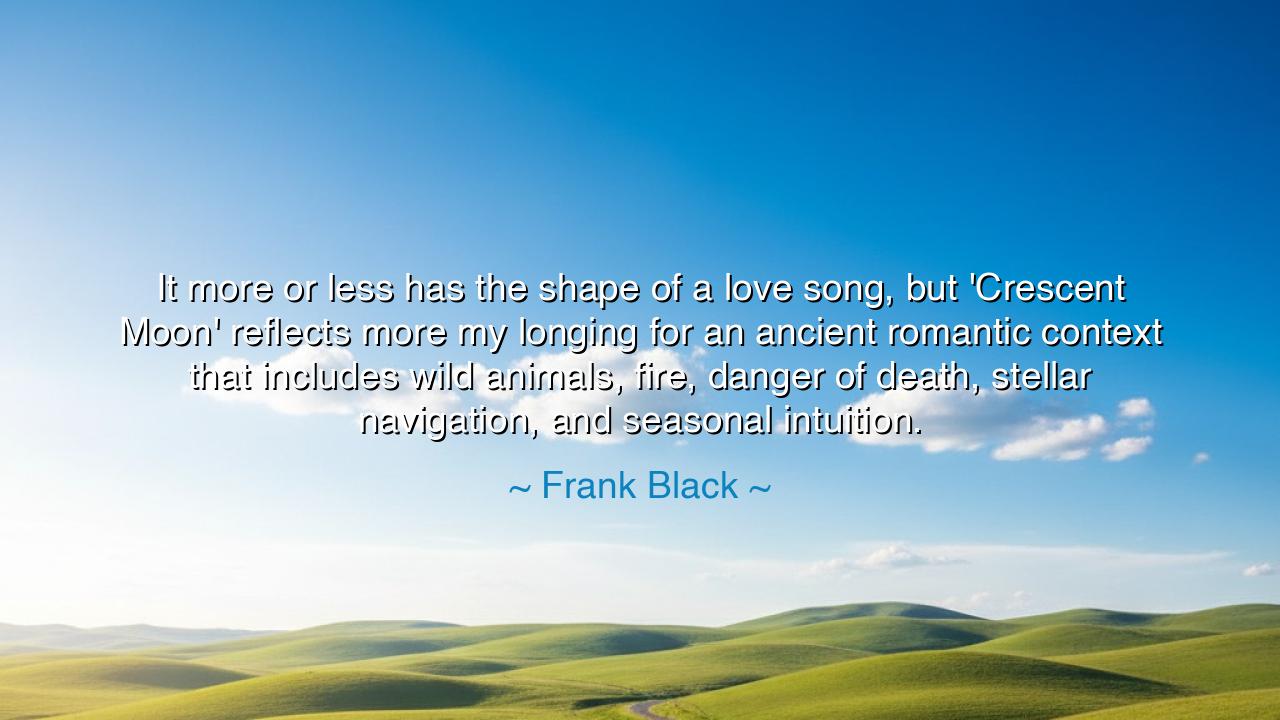
It more or less has the shape of a love song, but 'Crescent Moon'
It more or less has the shape of a love song, but 'Crescent Moon' reflects more my longing for an ancient romantic context that includes wild animals, fire, danger of death, stellar navigation, and seasonal intuition.






In the words of Frank Black, “It more or less has the shape of a love song, but ‘Crescent Moon’ reflects more my longing for an ancient romantic context that includes wild animals, fire, danger of death, stellar navigation, and seasonal intuition.” These words reach far beyond music. They speak to the eternal yearning in the human soul for a time when life was lived closer to the elements, when love was not wrapped in comfort and routine, but tested by the raw forces of nature. What Black names here is not mere nostalgia, but a call to remember the primal roots of passion, survival, and wonder.
The love song he describes is shaped like those we know today—melodic, lyrical, tender. Yet he confesses that its core is not only sweetness, but a deeper longing, a remembrance of the days when to love someone meant to risk everything: to protect them from the night’s predators, to gather food and firewood, to face the uncertainty of survival beneath the crescent moon. This was love in its most elemental form—romance interwoven with danger, devotion tested by wilderness, affection bound with courage.
The ancients lived within this romantic context without choice. The hunter who left his fire at dawn to track beasts into the forest risked not returning. The sailor who guided his ship by stellar navigation placed his life in the hands of the constellations. The farmer, attuned to seasonal intuition, knew that love and livelihood alike depended on listening to the rhythm of the earth. In such a world, to love was to stand together against peril, to share not only tenderness but also the very struggle for existence.
History offers us examples of such primal romance. Think of the great journey of Odysseus and Penelope. His voyage was fraught with wild animals, storms, and gods who sought to undo him. Her devotion was not marked by soft serenades but by patience through peril, faith sustained across decades. Their love was forged not in safety but in trial, in the constant nearness of the danger of death. This is the kind of romance Frank Black longs for—one where passion is inseparable from risk, where survival itself heightens the sweetness of union.
Yet in our age, many of these elemental struggles have been dulled by modern life. We live in houses against the wind, guided not by stars but by glowing screens, warmed by machines instead of fire, fed not by the hunt but by markets. Comfort has made love gentler, but also perhaps thinner, more fragile. Black’s words remind us that something vital has been lost: the sense that love is not merely feeling, but alliance, a partnership forged against the forces of the world. To recall the ancient romantic context is to restore love to its deeper power.
The lesson, then, is this: do not let your love grow soft in comfort. Though the dangers of old may no longer surround you, seek ways to keep passion alive through trial, adventure, and shared struggle. Climb mountains, walk into forests, light fires beneath the open sky, and remember that love is not only roses but also resilience. Let your heart beat to the rhythm of seasonal intuition, attuning itself to change, growth, and renewal. Love is strongest when it breathes the air of the wild, when it walks hand in hand with courage.
And what should you do? Step outside the walls of comfort. With the one you love, seek experiences that awaken both joy and awe. Learn to read the stars together, sit by a fire and tell ancient stories, embrace moments where uncertainty and risk remind you of life’s fragility. For in doing so, you honor the wisdom of ages past: that true romance is not a retreat from the world’s dangers, but a shared journey through them. And under the light of the crescent moon, you may find your love renewed, fierce and unyielding, like the ancients who lived and loved before us.






AAdministratorAdministrator
Welcome, honored guests. Please leave a comment, we will respond soon